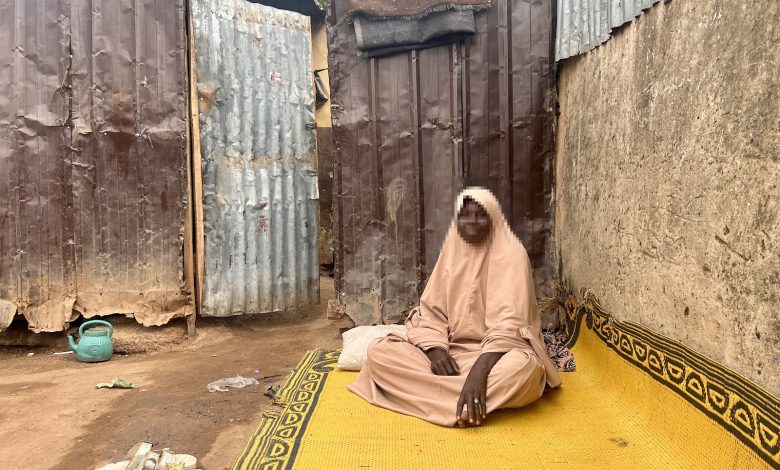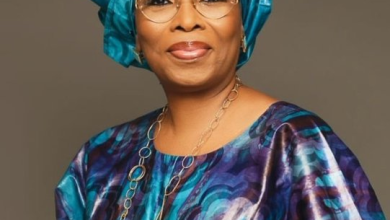A Displaced Widow’s Love For Her Chosen Son

|
Getting your Trinity Audio player ready...
|
Although Hadiza Aliyu did not know how she would save or change the life of a frail newborn abandoned in an uncompleted building, she knew she simply had to bring him home.
It was as if his spirit had beckoned her, she said. And even before she saw him, even before summoning the strength to meet the woman handing him over, she felt an inexplicable sense of empathy for him.
She trusted that God would assist her with the sustenance of his treatment, feeding, and upkeep, she told HumAngle. She will continue to sew clothes for a living and teach her daughters to do the same. She will also continue to serve as a midwife in the IDP Camp in which she lives.
Before Hadiza was displaced and widowed in 2014, she lived a peaceful and prosperous life with her husband in the Gwoza area of Borno State, northeastern Nigeria. She had a thriving business, selling fabrics that were always in high demand.
She also owned a farm, which she managed through a team of hired labourers who resided in makeshift rooms on the farm. She provided them with food, and they tended to her farm year-round. During harvest, a large truck would bring in her produce, and after a full day of sorting, she paid the workers either in cash or food, or both, as earlier agreed.
Her efforts were complemented by her husband, a businessman who owned three shops in town, where he sold a wide variety of clothes and shoes. Like his wife, he was also a livestock farmer.
“Sometimes, before heading out for the day, we would exchange products to sell for each other— I would sell his shoes, and he would sell my fabrics,” Hadiza said as she recalled the good old days.
One night in September 2014, Hadiza who was heavily pregnant, received a frantic warning from a neighbour who jumped over the fence into her yard. The neighbour alerted her that Boko Haram terrorists were abducting young girls and boys, and the chilling screams of the victims could be heard from a distance. With five daughters and two sons of her own, Hadiza’s concern for their safety became paramount.
“I started to panic. I knew the only safe exit was through the chickens’ cage in the backyard and my neighbour struggled to bring it down. Just then, we heard the sound of the terrorists’ car in front of my house. I felt a sudden rush of energy, ran back to gain momentum and slammed into the fence. It cracked slightly, just enough for me and my children to go through,” Hadiza explained.
Displaced
They ran down the alley behind her house until they arrived at a garden where they hid behind bushes and shrubs. Throughout these periods, her husband’s whereabouts were unknown. At around midnight, they got up from their hiding spots, took off their shoes, and silently walked under a dark, cloudy sky that soon split open and began to pour.
They walked and rested, and walked and rested, until the day broke. On getting to a town in the morning, she borrowed a phone and called her younger brother, who came with a car and drove them to Mubi in Adamawa State.
Upon arrival, Hadiza and her children were taken to a school that had been converted into a temporary settlement camp. They received essential provisions, including food, supplies, and cooking materials. Twenty-four days later, Hadiza welcomed a new addition to her family – a baby boy, born in the midst of uncertainty and displacement.
Like every mother, she reached out to Gwoza on the phone to share the news of childbirth but learnt that her husband had been killed during the attack. “I was informed that my husband was killed in one of his shops during an attack. They (family) found his body, prayed over it and buried it,” she narrated.
In a touching gesture, the relatives removed Hadiza’s husband’s silver ring and brought it back to her.
Multiple migrations
Hadiza and her children had only lived in Mubi for a month before the Boko Haram terrorist group attacked. It was October 2014 when the news spread that they had entered the town, meaning Hadiza had to flee again.
Hadiza was with her newborn and children, running with no clear direction until they found themselves at the Cameroon border. After hearing her stories, the soldiers at the border gave her some money. Too tired to keep going and unsure how to use it, she asked for help. The soldiers then drove her to a checkpoint in Jimeta, Adamawa State, where she asked to be taken to Maiduguri to stay with her aunt.
She lived with her aunt for three months, until in January 2015, her brother-in-law sent some money and a car for them to be taken to the FCT, Abuja where he offered to take care of them. But when they arrived, they were dropped off at an empty house and neglected.
Hadiza sold her gold earrings and the four fabrics she had managed to carry with her, at the market, using the money to buy food and thread. She and her eldest daughter began to sew caps so they could sell them.
For months, her children did not go to school. When her brother-in-law finally enrolled them, he only paid tuition at a government school, but did not buy their books.
“My brother-in-law acted as if we were becoming burdens to him. So, I told him to just let us leave and find our way. God is with us, and He will help us. That’s when he started insulting me, saying we should go beg on the streets or go to Area 1, where displaced people were. I was enraged,” Hadiza added.




